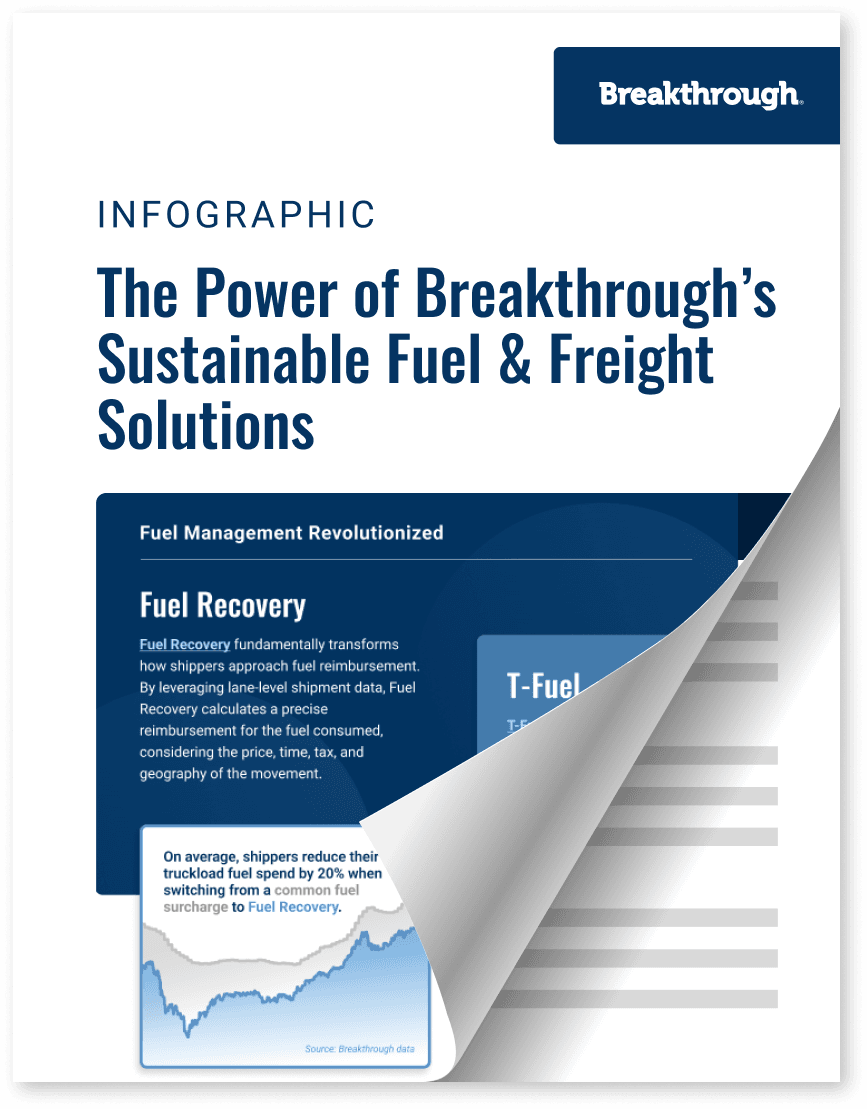The Power of Breakthrough's Sustainable Fuel and Freight Solutions

Freight
3 min read
July 17, 2024
Market Events
4 min read
July 16, 2024
Market Events
3 min read
July 8, 2024

4 min read
July 18, 2023

Share:
With the price of labor and materials remaining high amid inflation, transportation leaders are under pressure to more aggressively manage costs to regain margin. But they’re also tasked with something that can feel like a competing priority: reducing carbon emissions.
According to Breakthrough’s recent survey of transportation leaders at U.S.-based shippers and carriers, nearly all (94%) said mounting consumer demand for more sustainable products makes reducing transportation emissions a critical priority, a message their executive leaders are echoing. For more than 40% of transportation leaders, pressure to improve sustainability most often comes from the C-suite — the same group seeking budget consciousness.
So, where does this leave transportation leaders? Sixty percent told us ongoing macroeconomic forces will make it nearly impossible to meet emissions reduction goals over the next 12 months — a sentiment grounded in the misperception that more sustainable transportation modes are more expensive. But with the right data and technology, delivering on these competing priorities is more achievable than it may seem. These tools unlock market-based fuel reimbursements alongside targeted carrier selection and load-level emissions tracking capabilities. Armed with this technology, you can make a dent in fuel costs and emissions targets at the same time — enabling you to demonstrate meaningful progress to your CEO.
With Breakthrough’s Fuel Recovery solution, you can retake control of your transportation spend, saving up to 20% on diesel fuel costs while simultaneously gaining clear network visibility into fuel consumption to inform emissions reduction.
That means the next time your CEO asks the following questions, you can be ready with answers like these:
1. What strategies are in place to mitigate the impact of rising fuel prices on our transportation expenses?
Answer with Fuel Recovery: By using market-based fuel reimbursements, we save an average of 40 cents per gallon on fuel costs compared to the common fuel surcharge. That’s because we’re able to account for daily price changes, market fuel prices along individual lanes, tax exposure by state, and precise fuel consumption. Whenever diesel prices fluctuate, our reimbursement rates adjust accordingly to eliminate overpayments.
2. What steps are we taking to enhance sustainability and reduce the environmental footprint of our transportation activities?
Answer with Fuel Recovery: Now that we have clear visibility into every lane in our network, we’re able to accurately record our baseline fuel consumption and baseline emissions output and intensity. With this enhanced visibility, we are actively developing targeted strategies to optimize fuel efficiency, such as mode optimization, carrier selection, and energy choice. Additionally, having accurate baseline fuel consumption data allows us to set realistic and measurable emission reduction goals, track our progress over time, and showcase our commitment to sustainable transportation practices to our stakeholders and customers.
3. Can you provide an update on key performance indicators (KPIs) and metrics that track our transportation performance, cost savings, and emissions reduction progress?
Answer with Fuel Recovery: With access to granular network data, we’ve been able to establish benchmarks for linehaul rates, intermodal use, contract vs. spot mix, and emissions reduction progress. This data not only enables us to see how we’re doing now, but also empowers us to make lane-level adjustments in real time to move the needle on all our KPIs. Moreover, Fuel Recovery provides us with ecosystem data that shows how our progress ranks within the broader industry landscape.
Switching from traditional fuel surcharges to market-based reimbursements has benefits that extend beyond cost savings. Fuel Recovery’s comprehensive network data enables you to pinpoint opportunities for reducing fuel spend and make progress on emissions reduction — actions that can be further supported by Breakthrough’s full suite of solutions.
Ready to start saving money and reducing emissions? Contact us for a demo today.

3 min read
July 17, 2024
Maximize transportation efficiency with cohesive fuel and freight strategies. Discover the power of enhanced visibility, cost-effectiveness, and sustainability.
Read more
4 min read
July 16, 2024
Discover how the recent elections in Mexico and the EU are expected to influence energy policies, fuel prices, and dynamics in the transportation sector.
Read more
3 min read
July 8, 2024
Understand the state-specific changes in diesel tax rates and explore strategic solutions for shippers to accurately calculate fuel reimbursements to carriers.
Read more